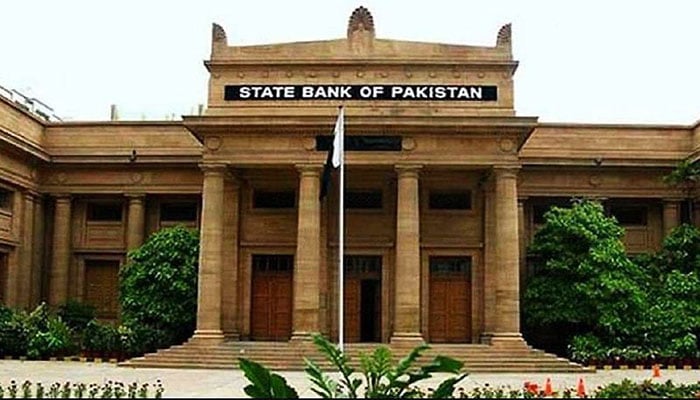SBP Amendment Bill proposes domestic price stability
ISLAMABAD: The controversial State Bank of Pakistan (SBP) Amendment Bill 2021 proposes domestic price stability as the primary objective of the central bank.
The secondary objective has been envisaged as financial stability. Contrary to the past, the proposed SBP bill 2021 does not have any role to secure monetary stability and fuller utilization of the country’s productive resources.
For appointment of Members of Monetary Policy Committee (MPC), the proposed law has taken care of conflict of interest. It is proposed that no person appointed under section 10A shall act as a representative of any commercial, financial, agricultural, industrial or other interest, or receive or accept directions therefrom, in respect of duties to be performed under this Act. Every such person shall fully and promptly disclose to the Board any interest, whether personal, commercial, financial, agricultural, industrial or other, which he or any dependent member of his family may directly or indirectly hold or be connected with and which becomes the subject of consideration by the Board, and shall recuse themselves from any Board deliberations and voting related there to such cases of conflict of interest.
An Audit Committee comprising three or more non-executive Board members is proposed to be constituted by the Board. The Chief Internal Auditor is proposed to be appointed by the Board as an employee of the Bank on the recommendation of the Audit Committee.
According to the salient features of the proposed SBP’s Amendment Bill 2021, in light of international best practices and domestic experiences, legal framework of SBP is being amended to clearly define the objectives of SBP to improve its accountability, outline SBP’s functions in line with its objectives, provide necessary financial resources to help achieve objectives, increase functional and administrative autonomy of SBP, improve transparency in operations of SBP and strengthen accountability by making oversight functions stronger and enhancing reporting requirements.
The SBP is being provided with sufficient financial resources as authorized and paid up capital was proposed to be increased from one hundred million rupees to five hundred billion rupees and initial paid up capital to Rs one hundred billion rupees. The paid up capital and general reserves proposed to be increased to 8% of the monetary liabilities of the Bank through retention of 20% of distributable profits each year. The General Reserve only to be used for increasing capital or cover losses.
If capital and general reserves fall below zero (-ve) then it is proposed that the board shall prepare a report on causes and extent of shortfall and the federal government to transfer to the Bank necessary amount in cash or negotiable instruments to restore paid-up capital. For distribution of profits, the SBP proposed major changes in the bill as currently there is no specific formula and it is decided with prior approval of the federal government. It is now proposed that no federal government’s approval would be required as it would be based on a formula to be incorporated in the proposed lawt.
Under the existing SBP law 1956, the SBP was mandated to carry out quasi-fiscal operations, including rural credit, industrial credit, export credit, loans guarantee, and housing credit.
It is proposed that the quasi-fiscal operations, defined as monetary actions taken on behalf of the government, shall be discontinued. However, refinancing facilities, which SBP has used to support access to credit in underserved sectors still allowed.
-
 UK Asylum System Faces Changes As Refugees Will Get Temporary Protection Only
UK Asylum System Faces Changes As Refugees Will Get Temporary Protection Only -
 Meghan Markle Has Realised ‘star Power’ Is Not Enough After Jordan Trip
Meghan Markle Has Realised ‘star Power’ Is Not Enough After Jordan Trip -
 USC Leading Scorer Chad Baker-Mazara Leaves Program Amid Losing Streak
USC Leading Scorer Chad Baker-Mazara Leaves Program Amid Losing Streak -
 Google Is Winding Down Popular App 'Pixel Studio': Here's Why
Google Is Winding Down Popular App 'Pixel Studio': Here's Why -
 Zendaya, Tom Holland Secretly Married?
Zendaya, Tom Holland Secretly Married? -
 Dove Cameron Reveals Why She's Limiting Relationship Talk After Damiano David Engagement
Dove Cameron Reveals Why She's Limiting Relationship Talk After Damiano David Engagement -
 Bulls Vs Bucks: Giannis Out, Simons And Williams Sidelined
Bulls Vs Bucks: Giannis Out, Simons And Williams Sidelined -
 Princess Beatrice Is ‘haunted’ By Dreadful Shamed Andrew Arrest
Princess Beatrice Is ‘haunted’ By Dreadful Shamed Andrew Arrest -
 Panthers Vs Islanders: Dmitry Kulikov Returns From Injured Reserve As Schwindt Hits IR
Panthers Vs Islanders: Dmitry Kulikov Returns From Injured Reserve As Schwindt Hits IR -
 SAG-AFTRA Drops SAG Awards Name To Rebrand
SAG-AFTRA Drops SAG Awards Name To Rebrand -
 Next Full Moon: How To Watch The Total Lunar Eclipse On March 3
Next Full Moon: How To Watch The Total Lunar Eclipse On March 3 -
 Bhad Bhabie Shares Tender Moment With Daughter Amid Cancer Setback Hint
Bhad Bhabie Shares Tender Moment With Daughter Amid Cancer Setback Hint -
 Silver, Gold Prices Surge Amid Geopolitical Uncertainty After US-Israel Attack On Iran
Silver, Gold Prices Surge Amid Geopolitical Uncertainty After US-Israel Attack On Iran -
 Britain To Trial Social Media Ban For Hundreds Of Thousands Of Children Under-16
Britain To Trial Social Media Ban For Hundreds Of Thousands Of Children Under-16 -
 Prince Harry Should Face Same Fate As Shamed Andrew, Says Expert
Prince Harry Should Face Same Fate As Shamed Andrew, Says Expert -
 Oil Price Jumps, Stocks Fall After US And Israel Strike Iran
Oil Price Jumps, Stocks Fall After US And Israel Strike Iran




